Text
My friend Mina brought to my attention that Cleopatra: A Sourcebook edited by Prudence J. Jones is available free for download up on academia.edu!
72 notes
·
View notes
Photo
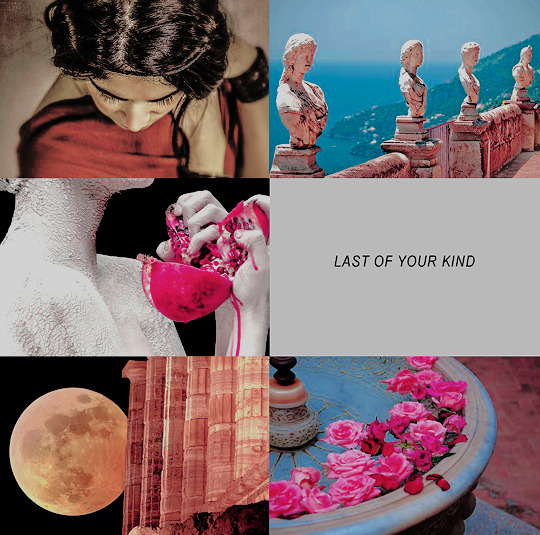

❝ Cleopatra Selene was the most important royal woman of the early Augustan period…Despite the self destruction of her parents…Cleopatra Selene could point to them representing a lineage that typified the best of Hellenistic monarchy and Roman aristocracy. Her vigorous promotion of her mother’s legacy stood in sharp contrast to the negative image being disseminated in contemporary Augustan poetry. In theory, she could claim rule of almost all of North Africa and presumably was greatly respected throughout her actual territories. Her promotion of art and scholarship provided a transition between Hellenistic monarchy and Rome…She was also an important player in the establishment of the role of aristocratic women in the Augustan world….thus assisting in the elevation of women throughout the Augustan world. ❞
─ Duane W. Roller, Cleopatra’s Daughter: And Other Royal Women of the Augustan Era
☾ Cleopatra Selene II, Queen of Mauretania and daughter of Cleopatra VII, Macedonian Greek queen of Egypt, and Mark Antony, Roman triumvir. 40 - c. 5 BCE.
#my girl#love this so much!!#it is so amazing!#cleopatra selene#cant wait to start with my master thesis abou her
184 notes
·
View notes
Photo








She abused the indulgence of fortune no less than that of her father. Of course her love of literature and considerable culture, a thing easy to come by in that household, and also her kindness and gentleness and utter freedom from vindictiveness had won her immense popularity, and people who knew about her faults were amazed that she combined them with qualities so much their opposite.
Her father had more than once, speaking in a manner indulgent but serious, advised her to moderate her luxurious mode of life and her choice of conspicuous associates. (…) Augustus persuaded himself that his daughter was light-hearted almost to the point of indiscretion, but above reproach. (…) He used to tell his friends that he had two somewhat wayward daughters whom he had to put up with, the Roman republic and Julia.
One day she came into his presence in a somewhat risque costume, and though he said nothing, he was offended. The next day she changed her style and embraced her father, who was delighted by the respectability which she was affecting. Augustus, who the day before had concealed his distress, was now unable to conceal his pleasure. “How much more suitable”, he remarked, “for a daughter of Augustus is this costume!” Julia did not fail to stand up for herself. “Today”, she said, “I dressed to be looked at by my father, yesterday to be looked at by my husband.”
Here is another well-known story. At a gladiatorial show Livia and Julia drew the attention of the people by the dissimilarity of their companions; Livia was surrounded by respectable men, Julia by men who were not only youthful but extravagant. Her father wrote that she ought to notice the difference between the two princesses, but Julia wittily wrote back, “These men will be old when I am old”.
Julia’s hair began early to go grey, and she used to pluck out hairs in private; one day her father came in suddenly and surprised her beauty specialists at their work. Augustus noticed the grey hairs on their clothing. In another conversation some time later he raised the question of age, and asked his daughter whether as time went on she would rather be grey-haired, he contradicted her by saying, “So why are those women in such a hurry to make you bald?”
After listening to a serious friend who tried to persuade her that she would do better if she copied her father’s frugal habits, Julia said, ‘He forgets that he is Caesar, but I remember that I am Caesar’s daughter". (Saturnalia - Macrobius, taken from Women’s Life in Greece & Rome - Mary R. Lefkowitz and Maureen B. Fant)
434 notes
·
View notes
Photo





Julia the Elder and Iullus Antonius in DOMINA 1x06
246 notes
·
View notes
Photo






I always knew I could be the one
Though I feel the endless pain of being
And I am scorched by the sun
Of humble origins and born of the cursed sex
Julia Augusti Filia + ‘Brutus’ by The Buttress
237 notes
·
View notes
Photo





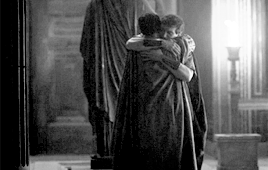

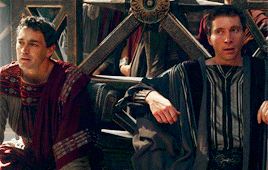
Agrippa doesn’t want your power, he wants your love!
DOMINA (2021)
384 notes
·
View notes
Photo


because I’m the devil who’s searching for redemption
2K notes
·
View notes
Photo




frozen (2013), dir. jennifer lee + chris bucks
minimalist posters 15/–
260 notes
·
View notes
Photo



I’m Livia Drusilla of the Claudii and we always keep our word.
225 notes
·
View notes
Photo
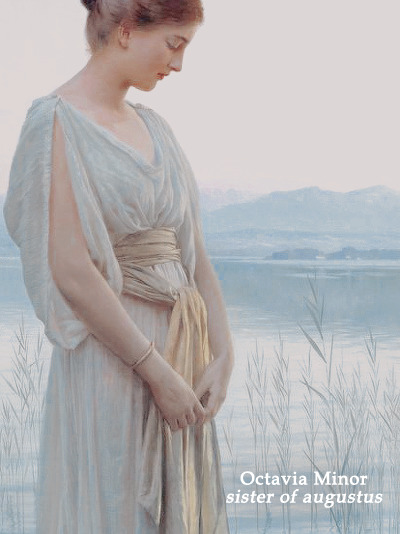



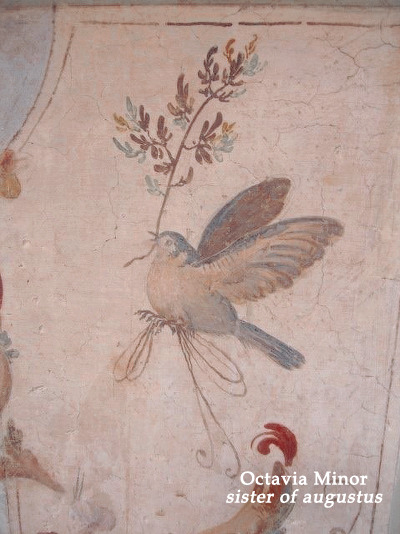

historical figures → octavia minor
Octavia, byname Octavia Minor, (born c. 69 BC—died 11 BC), was the full sister of Octavian (later the emperor Augustus) and wife of Mark Antony.
Octavia was the daughter of Gaius Octavius and his second wife, Atia. Before 54 BC Octavia was married to Gaius Marcellus, by whom she had two daughters (the Marcellae) and a son (Marcus). On the death of Gaius Marcellus in 40 she was married to Mark Antony, who at the time was ruling the Roman state with Octavian and Marcus Aemilius Lepidus. At first this marriage helped to reduce tensions between Antony and Octavian, and when the two rulers quarreled in 37, Octavia brought about peace between them, which resulted in the Treaty of Tarentum. But in 36 Antony left Italy to command troops in Parthia and while in the East resumed his liaison with the Ptolemaic Egyptian queen Cleopatra VII. Although Octavia brought troops and money to him (35), he refused to see her, and in 32 he obtained a divorce. Octavia was a faithful wife and mother who raised Antony’s children by Cleopatra along with her own children. After the death of her son Marcellus in 23, she withdrew from public life. The Porticus of Octavia in Rome is named for her.
324 notes
·
View notes
Photo

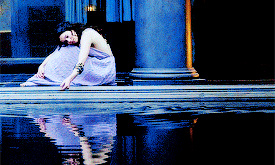






make me choose: julia augusti or livia: @chryseis
Julia Augusti Filia, (39 BCE - died CE 14) was the Roman emperor Augustus’ only child, whose scandalous behaviour eventually caused him to exile her.
Julia’s mother was Scribonia, who was divorced by Augustus when the child was a few days old. Julia was brought up strictly, her every word and action being watched. After a brief marriage to Marcus Marcellus, who died in 23 BC, Julia wedded Marcus Vipsanius Agrippa, Augustus’ chief lieutenant, in 21 BC. Their two eldest sons were adopted by Augustus in 17 BC and given the names Gaius and Lucius Caesar. Julia had a third son, Agrippa Postumus, and two daughters, Julia and Vipsania (later known as Agrippina the Elder).
With Agrippa’s death in 12 BC, Augustus’ wife, Livia, was able to convince him to favour her own sons by a former marriage, Tiberius and Drusus, as possible successors; Augustus forced Tiberius to divorce his wife and marry Julia in 11 BC. It was an unwanted and unhappy marriage for both of them. After an infant son by Julia perished in 6 BC, Tiberius went into voluntary exile, leaving Julia in Rome. Julia was accused of leading a promiscuous life, her adulteries becoming common knowledge in Rome. An affair with Mark Antony’s son Jullus Antonius was politically dangerous.
Finally Augustus discovered how Julia was behaving. After threatening her with death, he banished her to Pandataria, an island off the coast of Campania, in 2 BC. In AD 4 she was moved to Rhegium. Upon becoming emperor, Tiberius withheld her allowance, and Julia eventually died of malnutrition.
Julia’s faithlessness is not in question, but, according to the 5th-century-AD Roman author Macrobius(Saturnalia), she was a witty and intelligent woman and was loved by the people. Augustus showed her no mercy, however, calling her a “disease in my flesh.”
163 notes
·
View notes
Photo
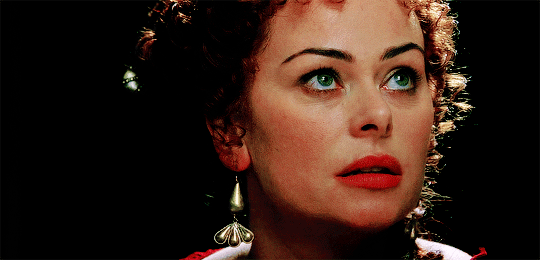




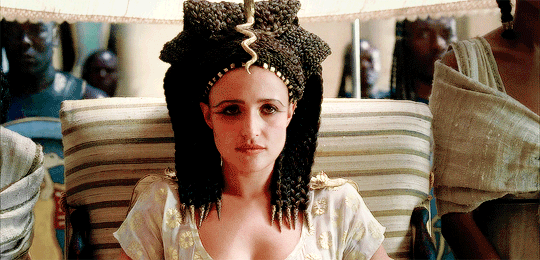




PERIOD DRAMA APPRECIATION WEEK | Day 1: Fav Period Drama
Four hundred years after the last king was driven from the city, the Republic of Rome rules many nations, but cannot rule itself. The city is constantly roiled by conflict between the common people and the nobility. Power is shared, and order maintained by two soldiers, old friends Gnaeus Pompey Magnus and Gaius Julius Caesar. Once, Pompey was acknowledged by all to be the greater man, but for the last eight years, while Pompey has kept the peace in Rome, Caesar has waged a war of conquest in Gaul, that has made him even more rich and popular. The balance of power is shifting, and the nobility have grown fearful - Though of noble blood himself, Caesar stands with the common people. A man like that, an aristocrat with soldiers, money and the love of the people… Might make himself king.
760 notes
·
View notes
Photo



Diane Kruger as Helen of Sparta in Troy (2004)
“So you have left the field: I wish you had died there, at the hands of that great soldier who was once my husband. You used to boast you were a better man than Menelaus, beloved of Ares, a finer spearman, and with a stronger arm. Go back, then, and challenge him, man to man. But my advice would be to stay here, not fight hand to hand with red-haired Menelaus, nor taunt him rashly, lest his spear conquers you.”
199 notes
·
View notes
Photo






make me choose: @elcctra: electra or orestes
“ORESTES: Never shall I see you again.
ELECTRA: Nor I see myself in your eyes.
ORESTES: This, the last time I’ll talk with you ever.
ELECTRA: O my homeland, goodbye. Goodbye to you, women of home.
ORESTES: Most loyal of sisters, do you leave now?
ELECTRA: I leave with tears blurring all that I see.”
― Euripides, Electra
257 notes
·
View notes
Text









Moodboards → Eivor Varinsdottir
"I will not be captive to another man's gaudy design. My destiny is mine to weave."
77 notes
·
View notes





